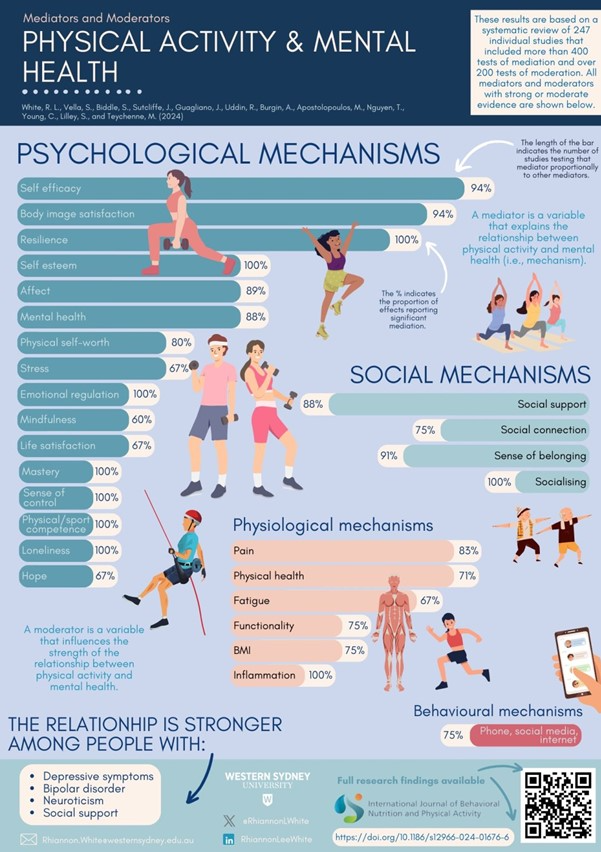In today’s busy world, mental health challenges such as anxiety, depression, and stress are increasingly common. According to Irish Life's Health of the Nation Report 2024, 1 in 4 adults report feeling stress, depressed or anxious most of the time and there has been a 15% increase in severe distress in under 35’s since 2022. We caught up with Irish Life Wellbeing Consultant Rebecca Mahony for her insight on the links between mental health and exercise.
While therapy, medication, and mindfulness practices are widely used and very important approaches for mental wellbeing, one powerful and commonly overlooked remedy is movement. Whether it’s a brisk walk, yoga or strength session, regular physical activity has a profound impact on the mind.
Results of a recent best-evidence systematic review revealed strong evidence for 12 mediators (mechanisms) for which exercising promotes mental wellbeing including self-esteem, physical self-worth, resilience, social connection, physical health, pain and fatigue. This positive corelation between physical activity and mental health is stronger among people with social support, depressive systems, bipolar disorder and neuroticism.

How is exercising impacting our mind?
1. Reduces Stress and Anxiety
Physical activity reduces stress hormones -cortisol levels and stimulates our happy hormones, our endorphins. These natural mood lifters can create a sense of calm and help combat feelings of worry. Regular movement therefore strengthens your ability to stay calm and to cope with life’s challenge.
-
Walking in nature (a practice often referred to as “eco-therapy”) has been shown to reduce anxiety even more than indoor exercise.
-
Activities like yoga and tai chi combine movement with mindfulness, enhancing relaxation.
2. Boosts Mood and alleviates symptoms of Depression
Movement triggers the release of serotonin and dopamine, neurotransmitters that play a key role in regulating mood. This is key for balancing the body chemically as it promotes our natural pain killers and mood elevators and gives us an energy boost. In fact, studies have found that exercise can be as effective as antidepressants in some cases, particularly for mild to moderate depression
An ongoing study ‘The Irish longitudinal study on aging’ (TILDA) is researching a representative sample of adults over 50 years and found that meeting PA guidelines is associated with 44.7% lower odds of developing depressive symptoms in later life. Short consistent bursts of 10 minutes a day were shown to be beneficial and meeting national guidelines (30+ mins a day) was not necessary to yield the same improvements.
3. Enhances Cognitive Function
Movement improves blood flow to the brain, which supports the growth of new neurons and enhances neuroplasticity. This can improve memory, focus, and problem-solving abilities while reducing the risk of cognitive decline and diseases such as Alzheimer’s.
-
Activities that require coordination and balance, such as tennis, yoga or dance, further stimulate brain function.
4. Improves Sleep
Poor sleep and mental health are closely linked. Movement helps regulate your circadian rhythm, making it easier to fall asleep and stay asleep.
-
Moderate aerobic exercise has been shown to increase the amount of deep sleep you get, which is crucial for emotional regulation.
-
Avoid high-intensity workouts right before bed, as they might temporarily increase alertness.
5. Builds Resilience and Confidence
Mastering new physical skills or achieving fitness goals can foster a sense of accomplishment and boost self-esteem.
-
Group activities like a running or walking club or fitness class can provide and foster social connections, enhancing mental well-being.
-
Outdoor activities encourage a sense of connection with the world, fostering gratitude and positivity.
6. Promotes Mind-Body Connection
Mindful movement practices, such as yoga, breathwork or pilates, encourage you to focus on your body’s sensations, fostering awareness and acceptance. This can help reduce overthinking and bring you into the present moment and distract your mind from any worries.
How can I move more?
Practical Tips for Incorporating Movement
-
Start small: Mental health benefits are not dose dependent, 5–10-minute windows are extremely beneficial in improving energy, alertness and mood.
-
Choose what you enjoy: Activities you love are easier to stick with. Life’s too short not to spend time doing things you enjoy!
-
Make it social: Exercise with friends, family, or a local club to get the added benefit of connection and support.
-
Mix it up: Variety keeps things interesting, prevents overuse injuries and challenges your body and mind in new ways.
Movement is a powerful, accessible, and natural tool for our improving mental health. So, get moving, and focus on integrating regular activity into your routine. See how it makes you feel- I can promise your mind will thank you for it!
References:
-
White, R.L., Vella, S., Biddle, S. et al. Physical activity and mental health: a systematic review and best-evidence synthesis of mediation and moderation studies. Int J Behav Nutr Phys Act 21, 134 (2024). https://doi.org/10.1186/s12966-024-01676-6
-
Laird E, Rasmussen CL, Kenny RA, Herring MP. Physical Activity Dose and Depression in a Cohort of Older Adults in The Irish Longitudinal Study on Ageing. JAMA Netw Open. 2023 Jul 3;6(7):e2322489. doi: 10.1001/jamanetworkopen.2023.22489. PMID: 37428505; PMCID: PMC10334250.